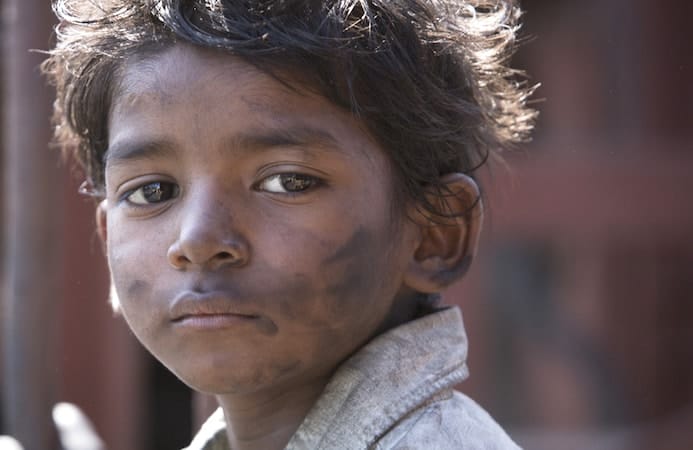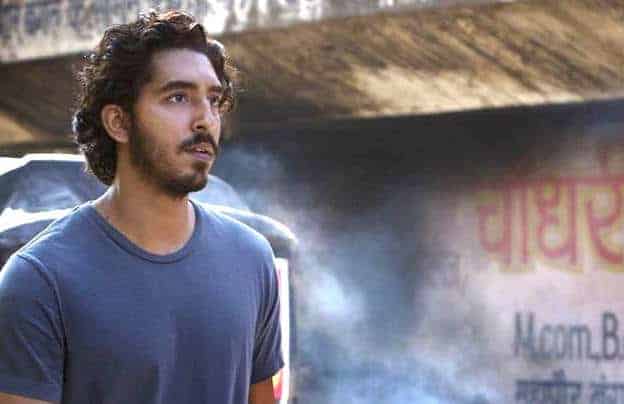Directed by Garth Davis and adapted from the true story “A Long Way Home,” Lion tells the fairytale saga of a young Indian boy, Saroo Brierley, who becomes lost a thousand miles away from his village, and is miraculously adopted by an Australian couple. After many harrowing misadventures as well as endearing capers, the film hands us over to the grown-up Saroo, now in college in Melbourne. Though his Australian family have been loving and supportive, Saroo increasingly burns with the need to find his Indian home, to find his mother and brother and let them know that he is alive and well.
That’s the set-up— but the film is by no stretch simply a beautifully told tale of a “lost boy” and his quest for home. Powered by urgent cinematography of chaotic Calcutta and the breathtaking coastline of Tasmania, Lion is graced with a suite of outstanding performances. Especially those of captivating young Sunny Pawar as the five-year-old Saroo, and Dev Patel as 26-year-old Saroo—but also a never-better Nicole Kidman as Saroo’s adoptive mother and Rooney Mara as Saroo’s college girlfriend.
 It’s always tricky casting two strong actors as a single character, the young version and then later the character as an adult. Tricky because as we fall in love with the first version—in this case the astonishingly poised and playful Pawar—it can be wrenching to accept the character newly matured in the formidable screen presence of Patel, who is all grown up from his days stealing scenes in Slumdog Millionaire and The Best Exotic Marigold Hotel. An exciting actor, the adult Patel exudes surprising sex appeal and knows how to use one of the strongest, most expressive faces in film. Caravaggio paints Shiva.
It’s always tricky casting two strong actors as a single character, the young version and then later the character as an adult. Tricky because as we fall in love with the first version—in this case the astonishingly poised and playful Pawar—it can be wrenching to accept the character newly matured in the formidable screen presence of Patel, who is all grown up from his days stealing scenes in Slumdog Millionaire and The Best Exotic Marigold Hotel. An exciting actor, the adult Patel exudes surprising sex appeal and knows how to use one of the strongest, most expressive faces in film. Caravaggio paints Shiva.
Reviewers have made much of this film as a tear-jerker, destined to reduce even the most jaded viewer to jelly. Certainly it can do that. But it’s complicated. There’s a Huck Finn quality to the nightmarish odyssey of the little boy, who goes out with his brother to seek any kind of work that will help keep themselves and their mother in food. He leaves one night with the beloved older brother, and ends up at a train station where the brother tells him to stay put. Little Saroo falls asleep and when he wakes up the brother is gone and he’s completely alone at the huge railway platform. Jumping into an empty train coach, he sleeps again—such a delicious fairytale—and when he wakes the train is moving. And it keeps on moving for days, all the while carrying him farther and farther away from home. Since he’s only a child, he has no way of knowing what has happened and where he is. And so things begin to unfold.
In true Dickens fashion, some of the strangers little Saroo meets are kind and helping. Others have darker purposes. These form the heart of the first half of the film, and watching the little boy running to, and from, a variety of situations is both nerve-wracking and exciting. The utterly darling Pawar has us in the palm of his hand and then his life suddenly blooms with the love and care of his new parents a world away.
 Nicole Kidman knocked me out in all of her scenes, but the one in which she explains to the grown-up Saroo just why she wanted to adopt him will destroy you. Even as Virginia Woolf in The Hours she was never this present, this entirely focused upon a single idea as she is here. (There’s also a second adopted Indian brother who has “issues,” and even in a fairytale the path to maturity never runs smoothly.)
Nicole Kidman knocked me out in all of her scenes, but the one in which she explains to the grown-up Saroo just why she wanted to adopt him will destroy you. Even as Virginia Woolf in The Hours she was never this present, this entirely focused upon a single idea as she is here. (There’s also a second adopted Indian brother who has “issues,” and even in a fairytale the path to maturity never runs smoothly.)
Once Saroo/Patel begins his Google-enhanced quest to pinpoint where he might have gotten on the train all those years ago, and struggles to locate his home village, the film gains intensity. Of course we want to see how he will find his home, whether his family still lives, and we can taste the reunion he so needs. But somewhere in there a generic ending starts to form itself. Not every stitch ends up in a neat crochet, a few corners of credibility are cut, and yet. And yet. The resolution of the quest is as satisfying as any epic tale can get.
The film was loaded with highest quality everything. Story, cinematography, acting, music, direction—I left feeling better than I had when I arrived. Lion delivered everything a movie should. And I loved it.
(Only one of those obligatory “true story” film endings, where they show footage of the real people upon whose lives the film is based, threatened to destroy the spectacular saga we’d just seen. Note to directors: don’t do this. Resist the cornball desire to show us “the way they are today.” Just don’t do it.]



I loved this movie too. And since I only came up with nine movies for my “Top Ten” on 2016, maybe this should be # 10!
Only # 10?!! I’m shocked. But still in awe of your judgment.